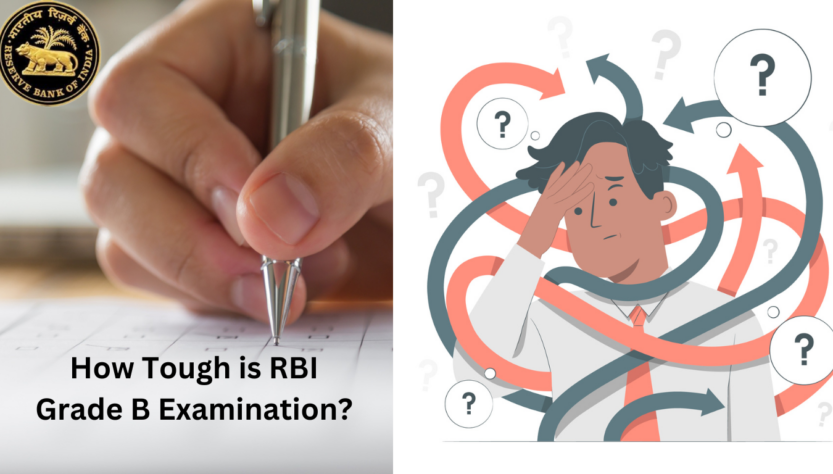Entering the prestigious Reserve Bank of India (RBI) is a dream for many aspiring bankers. Among the various paths to join this esteemed institution, the RBI Grade B examination stands out as a significant milestone. This examination serves as a gateway to a rewarding career in one of the most influential financial institutions globally. However, the journey to becoming an RBI Grade B officer is not without its challenges. In this article, we delve into the intricacies of the RBI Grade B examination, shedding light on its difficulty level, structure, and preparation strategies.
Understanding the RBI Grade B Examination:
The RBI Grade B exam is conducted by the Reserve Bank of India to recruit officers for various roles within the organization. It is considered one of the toughest competitive exams in the banking sector due to its comprehensive syllabus and rigorous selection process. The examination is conducted in three phases:
Phase-I: Preliminary Examination
Phase-II: Main Examination
Phase-III: Interview
Let’s break down each phase to understand the challenges involved.
Phase-I: Preliminary Examination
The preliminary examination is the first hurdle aspirants must cross on their journey to becoming an RBI Grade B officer. It comprises multiple-choice questions (MCQs) from four sections:
General Awareness
English Language
Quantitative Aptitude
Reasoning Ability
The difficulty level of the questions in the preliminary examination is moderate. However, the challenge lies in managing time effectively, as candidates have to answer a large number of questions within a limited duration. Therefore, speed and accuracy are crucial to succeeding in this phase.
Phase-II: Main Examination
Candidates who clear the preliminary examination proceed to the main examination, which consists of three papers:
Economic and Social Issues
English (Writing Skills)
Finance and Management/Economics/Statistics
The main examination is more challenging than the preliminary phase as it tests candidates’ knowledge in-depth. The Economic and Social Issues paper assesses candidates’ understanding of current affairs, economic concepts, and social issues. The English paper evaluates candidates’ writing skills, including essay and comprehension writing. The Finance and Management/Economics/Statistics paper tests candidates’ proficiency in their chosen subject.
Phase-III: Interview
Candidates who qualify in the main examination are shortlisted for the interview round. The interview aims to assess candidates’ personality, communication skills, and suitability for the role of an RBI Grade B officer. While the interview is not as academically demanding as the preceding phases, it is essential for candidates to articulate their thoughts clearly and demonstrate their knowledge and passion for banking and finance.
Challenges Faced by Aspirants:
The RBI Grade B examination poses several challenges for aspirants:
Vast Syllabus: The syllabus for the examination is extensive, covering a wide range of topics from various fields such as economics, finance, management, and current affairs. Aspirants need to have a strong grasp of these subjects to perform well in the examination.
Intense Competition: The RBI Grade B examination attracts a large number of aspirants from diverse educational backgrounds. The competition is fierce, with only a limited number of vacancies available each year. As a result, aspirants must strive to outperform their peers to secure a place in the final merit list.
Time Management: Managing time effectively during the examination is crucial for success. With a limited time frame for each section, candidates must prioritize questions based on their difficulty level and allocate time accordingly to maximize their score.
Conceptual Understanding: Unlike other competitive exams that rely heavily on rote learning, the RBI Grade B examination emphasizes conceptual understanding and analytical thinking. Aspirants must develop a deep understanding of fundamental concepts and their practical applications to tackle complex problems effectively.
Preparation Strategies:
To overcome the challenges posed by the RBI Grade B examination, aspirants should adopt a strategic approach to preparation:
Understand the Syllabus: Thoroughly review the examination syllabus to identify key topics and prioritize them based on their weightage and relevance. Focus on building a strong foundation in core subjects such as economics, finance, and management.
Practice Regularly: Practice is the key to success in any competitive examination. Solve previous years’ question papers and mock tests to familiarize yourself with the exam pattern and improve your speed and accuracy. Additionally, practice writing essays and comprehension passages to hone your writing skills for the English paper.
Stay Updated: Keep yourself updated with the latest developments in the fields of economics, finance, and current affairs. Read newspapers, magazines, and online resources to stay abreast of important events, government policies, and economic indicators.
Seek Guidance: Enroll in a reputable coaching institute or join online courses to receive guidance from experienced mentors and faculty members. Participate in group discussions and interactive sessions to enhance your understanding of complex concepts and improve your communication skills.
Conclusion:
The RBI Grade B examination is undoubtedly a challenging endeavor that requires dedication, perseverance, and strategic preparation. However, with the right approach and mindset, aspiring bankers can overcome these challenges and realize their dream of joining the Reserve Bank of India as Grade B officers. By understanding the examination structure, identifying key areas of focus, and implementing effective preparation strategies, aspirants can increase their chances of success and embark on a fulfilling career in the banking sector.
